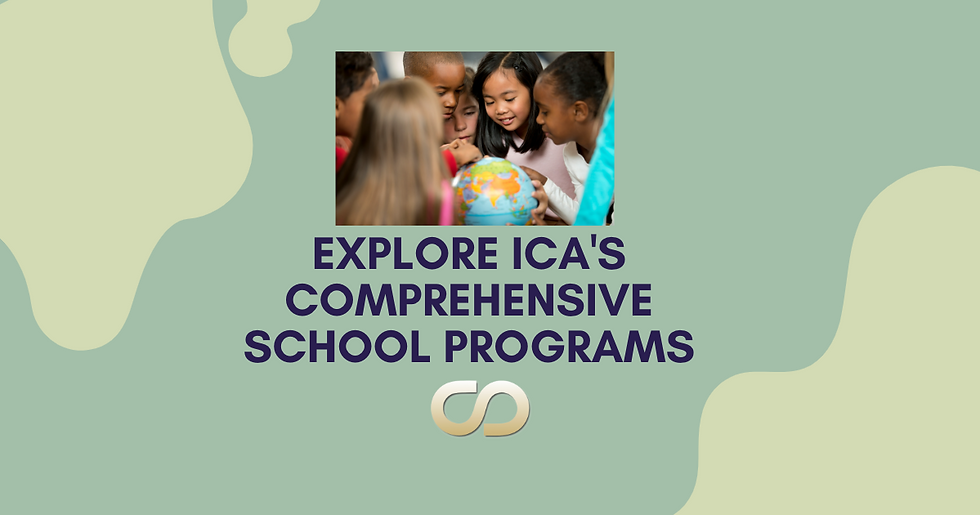The 4 Competencies of International Canadian Academy’s Global Learning Framework
- Ishita Agarwal
- Aug 18, 2022
- 3 min read
Bring the Canadian Way of Teaching to Your School

As a school student, do you remember zoning out while the teacher continued to lecture and draw triangles to explain the pythagorean theorem on the blackboard? Glued to your desk chair, did you yearn for recess to start so you could go play and have fun instead?

Millennials and boomers : don’t you wish your Pre-K to 12 experience had incorporated the magic of imagination, agency and self-discovery to mold you into self-sufficient individuals? International Canadian Academy (ICA)’s franchise education model has been developed to tackle this very problem statement. Our unique learning framework builds lifelong learners driven by four core competencies. These competencies foster life skills education which empower students to create unique perspectives by self-discovering pieces to complete their own distinct puzzles.
“Life skills education in schools refers to the interactive process of teaching and learning which focuses on acquiring knowledge, attitude, values and skills which support the behavior of the learner that enable them to take up the responsibility of their lives. Gaining greater resistance pressures and minimizing harmful behaviors”
Personal Values and Social Skills Student MTS and Its Development In Curriculum and School Program | Advances in Economics, Business and Management Research
Each ICA franchise is equipped with the International Comprehensive (IC) learning framework to foster a culture of lifelong learning. Our learning model is inspired by British Columbia (BC)’s curriculum as we believe the Canadian way of learning can transpire great changes across the globe. ICA’s unique adoption of this model
The following core competencies are geared towards building lifelong learners who have the tools to pursue and accomplish their aspirations.
ICA Competency #1: Thinking and Inquiring
As the name suggests, this competency aims to foster independent thinking through inquiry guided by personal questioning, investigation and observation in a safe environment. Our curriculum is inspired by Harvard Project Zero’s visible thinking pedagogy to spark inquisitive and curiosity based intellectual learning for a lifetime of opportunities.
“Inquiry has been described as a teaching method which combines student-centered, hands-on activities with discovery. Importantly, the educator acts as a facilitator of the learning activity, promoting student discussion and providing guidance rather than directing the activity.”
Inquiry-based learning to improve student engagement | Student Success Journal
Ultimately, this competency puts students at the driver's seat of the process of learning. It also helps learners develop metacognitive skills to question and learn for themselves. This leads to creativity in thinking and originality in forming opinions. Students are introduced to wicked problems of contemporary society and taught how to gather evidence to come up with unique, well-rounded solutions.
ICA Competency #2: Personal and Social Capabilities
ICA aims to cultivate communities of students who are equipped with the skills and knowledge needed to take care of themselves and nurture others. The curious and inquisitive nature fostered through the thinking and inquiry competency becomes the foundation for identity formation. The goal of building a personal and social identity is to enable students to find their purpose in the world and achieve their potential. This competency is at the heart of the British Columbia Curriculum which has greatly shaped ICA’s learning framework. Understanding one’s soul identity and finding a healthy way to interact with the world helps students grow into problem solvers. The video below shows practices to incorporate this competency.
ICA Competency #3: Communication and Creativity
This integral competency encourages students to communicate their thoughts and ideas in a clear, effective and confident way. Communication is directly linked with our bilingual education model in order to interact and connect with others fruitfully. Meaningful communication inspires creative takeaways from interactions and leads to innovative thinking. ICA’s digital competency through the Digital Media Academy provides students a 21st Century channel to explore and build on their creative ideas. ICA’s learning framework equips students to use technology in a responsible and purposeful way to foster authentic communication and collaborative creativity.
ICA Competency #4: Subject-specific Knowledge and Practice
Last but not the least, the IC Learning Framework beautifully incorporates subject specific knowledge through the amalgamation of the other 3 competencies. We equip students with imperative skills and personal attributes to explore their interests through the following subject areas:
Mathematics | Sciences |
Arts | Drama |
Social Science | Physical Education |
Languages | Design Technology |
Career Education | Music |





Comments